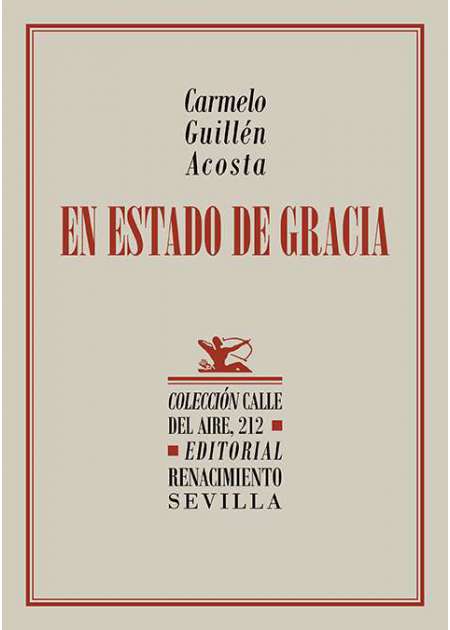Carmelo Guillén Acosta (Seville, 1955) gives us a new book of poems. After his compilation volume Learning to love. Complete (revised) poetry 1977-2007 (2007) and its subsequent releases (Life is the secret2009, and Redemptions, of 2017), In a state of grace is a book of enthusiastic celebration of human fullness thanks to the Incarnation. Parodying the words of Dámaso Alonso's sonnet about Lope de Vega, it could be said that each page of this collection of poems "drips life and sings life". Love and light invade and vivify everything.
If for Quevedo "all the everyday is much and ugly", Guillén Acosta's poetry is a hymn to "the value / of each thing, however fragile it may be" (13), to the sacredness of matter and the prosaic, in which he aspires to "feel the snap of the insignificant, / its everydayness", "that which drives me not to long for / another life different from this one in which I now live" (16), because in it everything is "tightly woven into our workmanship" (61).
Book

If it were not a cliché, and if the author had not already given ample evidence to say so, we would have to consider that we are before a book of full maturity, of mastery of expressive resources, always, of course, at the service of the core of meaning.
In the pages of this book the reader encounters the most categorical lie to an "ojalatera mysticism". The poet surrenders himself "point-blank to the tiny instant, / to the fleetingness of time, to so many facts / that barely peek out and fall into oblivion" (22); all this "in a present / that tastes like eternity" (23), "that never ends, similar / to the love of God, whose exercise / I discover without ceasing in this world / to the rhythmic beat of my life" (25). In order to discover this God who "disguises himself as routine" (Insaustiti dixit), it is necessary to be "contemplative, / that clairvoyance that silence brings, / that final harmony with everything created" (27), which allows us to remain "faithful to the insignificant, / to the palpitation of daily life", and "to see how life / impels me to give myself to the little things, / to its simple and fragile breathing" (29).
In times like those of today, with the advent of the "non-things" of the digital sphere, in which the real becomes liquid, loses density and vanishes, and in which we have become blind to the silent, habitual, minute realities (Byung-Chul Han), the poetry of Guillén Acosta invites us to anchor ourselves in being, in the solidity of the living rock.
The general celebratory tone, with the mastery of rhythm to which the author has accustomed us, bursts out on occasions in songs like this one: "Who would have thought / that these tiny things, / microscopic almost, / without any interest [...], would accompany me / in my daily struggle / until the end of my days, / and that they would be the key / that would open the door / narrow after my death" (30).
Guillén Acosta's poetry is not a way of expressing himself: it is a way of living, a contemplative, hopeful, grateful life, open to the great gift of human existence. A life, in short, dedicated, that "to give oneself to another person is, without a doubt, / the shortest way to reach happiness" (57). It is a poetry that speaks to the deepest human needs, because it springs from the "very living waters of life," as St. Teresa of Avila says.
If it is true that, as F.-X. Bellamy writes, time devoted to contemplation is the only thing that can save our world today, the book of poems In a state of grace operates in the reader the perlocutionary effect of making him value his own life, "revealing to him in time what escapes time", that is, what is permanent, actual, eternal. Here, precisely, lies, as Hölderlin warned ("what remains is founded by poets"), the essence of poetry. It is a necessary function today more than ever, when we are moving here and there, with the vertigo of an ambulance, but without fixed points and firm ground to anchor ourselves to. It is no wonder, then, that there is such a sense of absurdity and hopelessness. And so much dispensable medicalization.
If someone were to ask me why I like this book by Guillén Acosta, the answer that comes to me spontaneously is: because it helps me to glimpse the thickness of what, in my daily life, seems trivial and inane; because it helps me to better understand my life and my vocation as an ordinary Christian; because it helps me to live.
When turning the last page of this collection of poems, the reader does not know for sure whether he has been reading or praying. In any case, he has experienced that what he has in his hands at any given moment, no matter how often or how painful it may be (because "from time to time it happens: pain gives mouthfuls"), has an unprecedented density if he knows how to conjugate it with the verbs to love and to serve, in active and passive; and he has "made up his mind / that there is no other eternity" (44).








